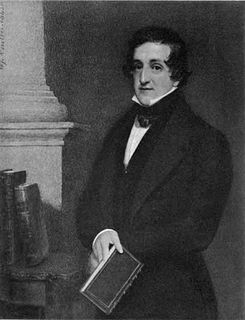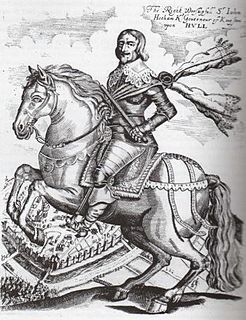Related Research Articles

Duke of Sutherland is a title in the Peerage of the United Kingdom which was created by William IV in 1833 for George Leveson-Gower, 2nd Marquess of Stafford. A series of marriages to heiresses by members of the Leveson-Gower family made the Dukes of Sutherland one of the richest landowning families in the United Kingdom. The title remained in the Leveson-Gower family until the death of the 5th Duke of Sutherland in 1963, when it passed to the 5th Earl of Ellesmere from the Egerton family.

Earl of Onslow, of Onslow in the County of Shropshire and of Clandon Park in the County of Surrey is a title in the Peerage of the United Kingdom. It was created in 1801 for George Onslow, 4th Baron Onslow.

Earl of Romney is a title that has been created twice.

Earl of Cottenham, of Cottenham in the County of Cambridge, is a title in the Peerage of the United Kingdom. It was created in 1850 for the prominent lawyer and Whig politician Charles Pepys, 1st Baron Cottenham. ) He served as Lord Chancellor from 1836 to 1841 and from 1846 to 1850. Pepys had already been created Baron Cottenham, of Cottenham in the County of Cambridge, in 1836, and was made Viscount Crowhurst, of Crowhurst in the County of Surrey, at the same time he was given the earldom. These titles are also in the Peerage of the United Kingdom. The viscountcy is used as a courtesy title for the Earl's eldest son and heir apparent.

The Hobhouse Baronetcy, of Chantry House in the parish of Bradford-on-Avon in the County of Wiltshire and of Westbury College in the County of Gloucester, is a title in the Baronetage of the United Kingdom. It was created on 22 December 1812 for Benjamin Hobhouse, a wealthy brewer and member of parliament for Bletchingley, Grampound and Hendon. His eldest son, the second Baronet, was a prominent writer and Liberal politician and notably served as Chief Secretary for Ireland and as President of the Board of Control. In 1851 he was raised to the peerage as Baron Broughton, of Broughton-de-Gyffard in the County of Wiltshire. However, he had no sons and on his death the barony became extinct, while he was succeeded in the baronetcy by his nephew, the third Baronet. The latter's son, the fourth Baronet, was also a noted Liberal politician and held office as Chancellor of the Duchy of Lancaster and as Postmaster General.

Sir John Gresham was an English merchant, courtier and financier who worked for King Henry VIII of England, Cardinal Wolsey and Thomas Cromwell. He was Lord Mayor of London and founded Gresham's School. He was the brother of Sir Richard Gresham.

The Sheriff is the oldest secular office under the Crown. Formerly the Sheriff was the principal law enforcement officer in the county but over the centuries most of the responsibilities associated with the post have been transferred elsewhere or are now defunct, so that its functions are now largely ceremonial.
Bletchingley was a parliamentary borough in Surrey. It returned two Members of Parliament (MPs) to the House of Commons of England from 1295 to 1707, to the House of Commons of Great Britain from 1707 to 1800, and to the House of Commons of the United Kingdom until 1832, when the constituency was abolished by the Great Reform Act.
There have been five baronetcies created for persons with the surname Vavasour, three in the Baronetage of England and two in the Baronetage of the United Kingdom. As of 2008 four of the creations are extinct while one is extant.

There have been four baronetcies created for persons with the surname Hope, three in the Baronetage of Nova Scotia and one in the Baronetage of the United Kingdom. As of 2010 one creation is extant, one dormant and two extinct.

The Blennerhassett Baronetcy of Blennerville in the County of Kerry, is a title in the Baronetage of the United Kingdom. It was created on 22 September 1809 for Rowland Blennerhassett, the member of a family that was originally settled in Cumberland, England, and subsequently at Frenze, Norfolk, and Barsham, Suffolk. Members of the Blennerhassett family represented Carlisle in almost every Parliament from the reign of Richard II to the reign of James I. This branch of the family settled in County Kerry during the reign of James I and its members frequently represented County Kerry and Tralee in the Irish House of Commons. The first Baronet's son, the second Baronet, was High Sheriff of Kerry in 1823. He was succeeded by his son, the third Baronet. He served as High Sheriff of County Kerry in 1820. His son, the fourth Baronet, was a Liberal politician.

There have been two baronetcies created for persons with the surname Wheler, one in the Baronetage of England and one in the Baronetage of the United Kingdom. One creation is extant as of 2008.
The Wyvill Baronetcy, of Constable Burton in the County of York, was a title in the Baronetage of England. It was created on 25 November 1611 for Marmaduke Wyvill, the former Member of Parliament for Richmond. The fifth and sixth Baronets also represented Richmond in the House of Commons. The title became dormant on the death of the seventh Baronet in 1774.

Titsey Place is an English country house near Oxted in Surrey, England. It was successively the seat of the Gresham and Leveson-Gower families and is now preserved by a charitable trust for the nation.
Sir Adam Browne, 2nd Baronet was an English politician who sat in the House of Commons in two periods between 1661 and 1689. He fought in the Royalist army in the English Civil War.
Sir John Evelyn was an English politician who sat in the House of Commons variously between 1626 and 1660.
Sir Marmaduke Gresham, 1st Baronet was an English politician who sat in the House of Commons in 1660 and from 1685 to 1689.
Sir John Evelyn (1591–1664) was an English politician who sat in the House of Commons at various times between 1628 and 1660. He reluctantly supported the Parliamentary side in the English Civil War.
Sir Thomas Gresham was an English landowner and politician who sat in the House of Commons between 1604 and 1622.